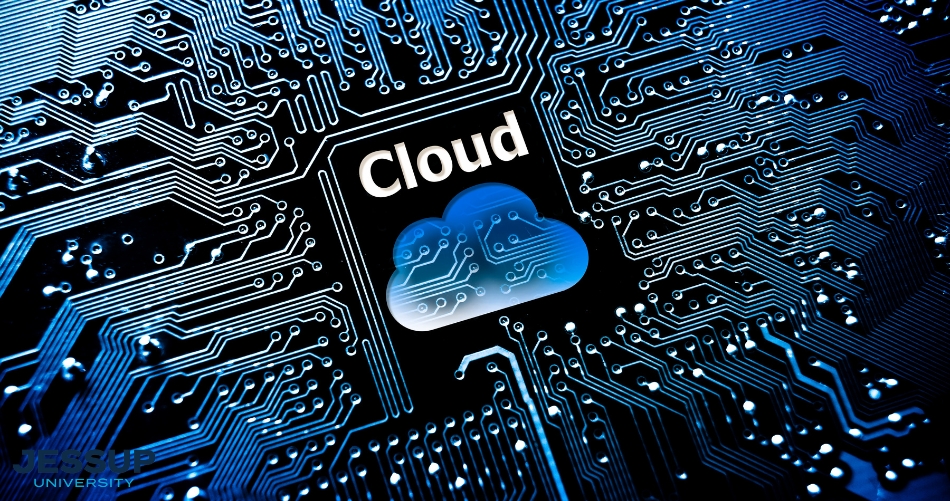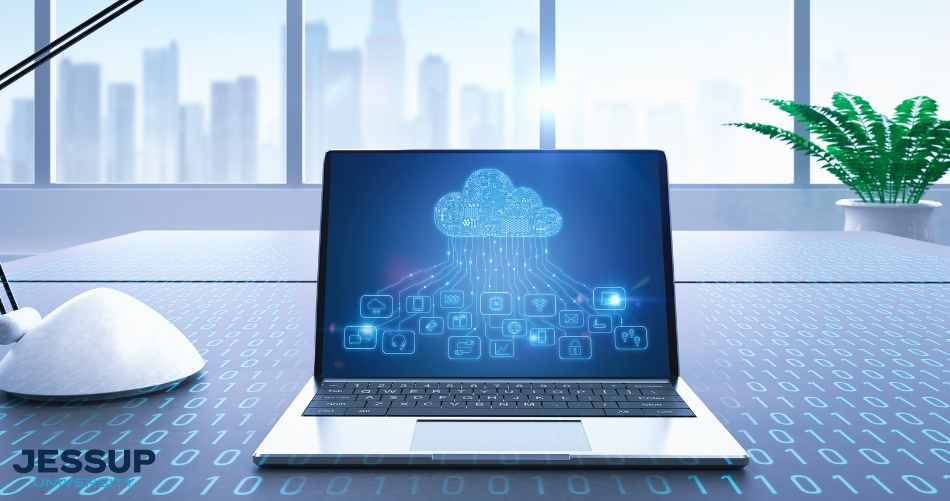
Edge Computing vs. Cloud Computing: Key Differences in 2024
Computing technology underpins nearly every aspect of the modern digital world. As emerging technologies like artificial intelligence, the Internet of Things (IoT), and 5G continue to develop rapidly, two computing paradigms have risen to prominence – edge computing and cloud computing.
Though sometimes conflated, edge and cloud actually refer to very distinct approaches to processing, analyzing, and storing data. This article will compare and contrast these two critical computing architectures, analyze their respective benefits and limitations, and assess how they can complement each other.
Want To Learn Computer Science From Home?
Jessup University’s Unique Online BS in Computer Science Can Make It Happen!
What is Edge Computing?
Edge computing is a distributed computing model whereby storage, compute, networking, and application services are placed closer to the source of data. This localized processing power enables data to be analyzed, processed, and transferred with very low latency.
The key components of an edge computing architecture include:
- Edge devices – Hardware such as routers, sensors, mobile devices etc. that facilitate data transfer between end users and service providers.
- Edge data centers – Smaller server facilities located close to data sources and edge devices.
- Edge nodes – The access points where devices connect to a wider network.
Positioning data storage and processing capabilities at the periphery of a network (the “edge”), rather than relying solely on centralized nodes or servers, provides greater efficiency and performance.
Benefits of Edge Computing
Adopting an edge computing approach offers several key advantages:
- Faster data processing – By analyzing data near the edge, results and responses can be delivered with very low latency.
- Reduced bandwidth constraints – Less data has to travel all the way to centralized data centers.
- Enhanced security – Localized data processing minimizes vulnerabilities from long distance data transfers.
- Improved reliability – Applications can continue functioning even with impaired cloud connectivity.
- Lower costs – Less reliance on expensive cloud computing resources.
What is Cloud Computing?

Cloud computing refers to a network model whereby IT resources are abstracted and provided quickly and flexibly over the internet. Rather than owning physical hardware or data centers themselves, users leverage shared computing resources via public, private or hybrid clouds.
Some core characteristics of cloud computing include:
- Virtualization – Servers, storage, databases and networking resources are delivered virtually through software abstraction.
- Automation – IT resource deployment and allocation is heavily automated for speed and efficiency.
- Scalability – Cloud infrastructure can scale elastically to align with changing demands.
- Self-service access – Users can provision necessary IT functionality on-demand without complex procurement.
By utilizing economies of scale across vast networks of hardware and data centers, cloud providers can deliver their services far more efficiently than individual enterprises building out their own expensive IT infrastructure.
Benefits of Cloud Computing
The flexibility, scalability and cost-effectiveness of cloud computing confers several advantages:
- Reduced expenditure – No upfront investments needed for physical infrastructure and easier pay-as-you go billing models.
- Global accessibility – Cloud services offer ubiquitous access from any device with an internet connection.
- Improved business agility – IT resources can be provisioned and updated on-demand to align with evolving business requirements.
- Enhanced collaboration – Distinct teams, business units and stakeholders can access, share and process organizational data seamlessly from anywhere.
- Increased reliability – Leading cloud providers deliver extremely reliable up-time given their use of resilient, redundant infrastructure.
Comparing Edge Computing vs Cloud Computing
Now that we’ve outlined these two critical computing paradigms individually, we can analyze them side-by-side to understand their differences and use cases:
While cloud computing delivers easily accessible, centralized computational power and storage, edge computing emphasizes localized, lower latency data processing.
Here are some key areas where edge and cloud diverge:
- Data Processing – Edge focuses on real-time analytics while cloud handles larger datasets.
- Infrastructure – Edge uses localized devices vs cloud’s reliance on data centers.
- Connectivity – Edge can work offline while cloud requires consistent internet access.
- Latency – Edge provides faster response times through localized data processing.
- Expenditure – Edge infrastructure can be more expensive to deploy than scalable cloud.
Ultimately, these two computing approaches are optimized for very distinct use cases and business requirements.
Real-World Use Cases

To understand how edge computing and cloud computing align with specific business needs, let’s overview some applied examples.
Edge Computing Use Cases
Here are some key applications where edge computing delivers unmatched benefits:
- Autonomous Vehicles – Self-driving cars require split-second data analysis to navigate which edge computing enables through localized compute.
- Industrial Automation – Monitoring and optimizing workflows in factories with many sensors and data streams benefits from edge processing.
- Augmented Reality – The real-time renderings and graphics of AR demand the rapid data transfer and analysis facilitated by edge networks.
- Healthcare Services – Wearables monitoring vital patient health metrics rely on instant analytics unlocked by edge.
Cloud Computing Use Cases
In contrast, here are some major applications better served by leveraging centralized cloud infrastructure:
- Enterprise Software – Virtually accessed programs for financial management, marketing, product design etc. avoid need for on-premise installation/maintenance.
- Big Data Analytics – Scalable storage and computational power of cloud platforms enables mass data processing.
- Media Streaming – Global on-demand video streaming is enabled by the content delivery networks running in hyperscale cloud data centers.
- Mobile Applications – Virtually every modern mobile app interfaces with cloud-based servers to deliver rich user experiences.
Employing a Hybrid Model
In most real-world contexts, businesses are best served not by choosing exclusively between edge or cloud computing but by combining them together into hybrid ecosystems.
This harmonization of localized edge capacity and centralized cloud power unlocks several key benefits:
- Edge handles urgent real-time decision making needing local processing
- Cloud provides abundant long term storage and big picture analytics
- Workloads are deployed optimally instead of limited to either ecosystem
Building adaptable systems leveraging both edge and cloud delivers optimization, scalability and future-proofing.
Interested in a Cloud Computing Career?

The Computer Science program at Jessup University offers specialized coursework covering the most essential aspects of the cloud ecosystem that companies urgently demand – from core infrastructure knowledge to cutting edge development paradigms, to all future aspects of cloud computing.
Educational Pathways for Cloud Computing Prospects
Considering a career in cloud computing? Jessup University’s Bachelor of Science in Computer Science presents an in-depth program that fuses theoretical foundations with practical application. With options for both in-person and online learning, our approach is adaptable to various educational preferences, allowing students to excel in their chosen format.
In-person attendees will benefit from 15-week courses, immersive community involvement, and comprehensive resource access. Those opting for the online route can take advantage of shorter, 7-week courses, flexible scheduling, and six annual start dates. This program offers specializations in Cybersecurity, Data Analytics, Data Science, Information Technology, and Software Engineering, providing a customized educational journey whether you’re on campus or studying from afar.
Jessup University’s Program Focus Areas and Principal Courses:
Cybersecurity (Online Only):
- Introduction to Cybersecurity
- Cybercrime and Governance
- Contemporary Cybersecurity
- Network and System Security
- Cyber Forensics
Data Analytics (Online Only):
- Foundations of Data Analytics I & II
- Data Analytics Principles & Techniques I & II
- Data Analytics Practicum
What is Data Science:
- Data Science 1 & 2
- Introduction to Artificial Intelligence
- Calculus II, Linear Algebra, Intro to Mathematical Proofs
Software Engineering Concentration:
- Mobile Computing
- Web Stack Technologies
- Data Structures & Algorithms 2
- Database Systems
…and more.
Crucial Skills for Success in Computer Science
What is computer science? It’s the field of study that focuses on computation, information, and automation using computers and computational systems. It’s the backbone and foundation behind software engineering, and can lead you many directions within the tech space.
Prospering in the ever-changing field of computer science is tied to a robust skill set. Jessup University’s program stresses expertise in advanced programming languages, proficiency in modern software development methodologies, and effective technical communication – to bring you the cloud computing skills necessary to conquer this world.
The curriculum deepens understanding of computational challenges, their requirements, and constraints. Additionally, it embeds a Christian ethical outlook towards technology, preparing graduates to be proficient and morally responsible in their field.
Whether participating in on-campus activities or via online modules, students are groomed to deploy their skills in various professional settings, armed with our Computer Science degree.
Want To Learn Computer Science From Home?
Jessup University’s Unique Online BS in Computer Science Can Make It Happen!
Are You The Next Superstar in the Computing Space?
While edge computing and cloud computing have some distinct differences in their architectures and ideal use cases, they should not be viewed as competitive alternatives. Edge computing brings key advantages like lower latency, improved security and reliability for real-time applications involving many distributed data sources and sensors. Cloud computing conversely allows organizations to leverage massive scalable storage capacity and computational power in remotely accessed data centers.
Either way, cloud solutions make it economical for companies to embrace emerging innovations without be slowed down by physical IT limitations or associated costs. So, the questions you need to ask yourself are these…
What ideas and skills can you bring to the table in this sought-after space? How can you help shape this industry in the near future?
There’s no doubt the world of cloud computing overflows with potential waiting to be tapped. Your ideas have the power to make real, positive impacts. Jessup University is where your passion for technology can evolve into a fulfilling career centered around conceiving what’s next. Contact us today to start your journey and begin shaping the future of cloud!
More Engineering & Technology Articles
-

How Many Programming Languages Should a Software Engineer Know?
Learning to code and deciding which programming languages to focus on can be an overwhelming task for aspiring software engineers. With new languages emerging all…
-

What is Data Science? An In-Depth Look for Aspiring Technology Professionals
What Type of Careers Are Available in Data Science, What Industries Employ Data Scientists, How Much Do Data Scientists Get Paid, What Skills Should a…
-

Edge Computing vs. Cloud Computing: Key Differences in 2024
Computing technology underpins nearly every aspect of the modern digital world. As emerging technologies like artificial intelligence, the Internet of Things (IoT), and 5G continue…
